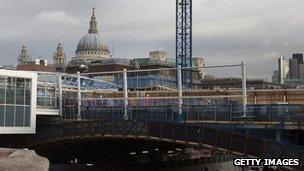Thameslink passengers 'waiting 30 years' for improvement works
- Published

The MPs praised the first phase of the project, a £1.7bn upgrade to tracks and stations
MPs have condemned the "excessive" length of time it has taken to upgrade Thameslink, the north-south cross London railway line.
There was "clear evidence" as long ago as 1989 that the line needed work, but passengers would not see the benefits of a £6bn upgrade until the 2020s, the public accounts committee said.
They will have waited "far too long - over 30 years", the MPs concluded.
The government said the delay was partly due to the project's complexity.
In its latest report, the committee also questioned the Department for Transport's use of the private finance initiative (PFI) in the project.
'Shambles'
"The procurement of new trains through a £1.6 billion PFI deal [in 2006 prices] has taken over three years longer than expected," committee chair and Labour MP Margaret Hodge said.
"The planned completion date has been put back to 2018. But meeting the timetable for delivering the new trains will be very demanding and risky.
"We are also sceptical about using PFI to fund this project.
"It is alarming that the department compared the PFI option against only one other private sector option and did not construct a public sector comparator to understand better the relative costs, risks and rewards of choosing a PFI funding route over a public one."
The committee also said the Department for Transport "suffers from a shortage of strong project management skills" and that the core Thameslink team of just five seemed "too small for a programme of this scale, compared with teams for other complex government projects".
The report also expressed concern about the management-style franchise arrangement for Thameslink, with MPs saying: "We are not convinced that the department has thought through all the risks associated with letting a new style of franchise for the first time."
But the MPs said the first phase of the project, a £1.7bn upgrade to tracks and stations in 2006 prices, had gone well and come in under budget.
A total of £3.55bn in 2006 prices is due to be invested on infrastructure during the project.
Bob Crow, general secretary of the RMT union, said: "This report is a complete vindication of everything that RMT has said about the chaotic Thameslink fleet replacement programme which took train-making in Britain to the brink of collapse.
"Never again must there be a repeat of this expensive fiasco which was cooked up by the same government department that brought us the rail franchising shambles.
"The battle to save train-building in the nation that gave the railways to the world carries on, starting with the Crossrail (cross-London scheme) fleet."
'Smooth delivery'
But a Department for Transport spokesman said: "As the committee acknowledges, the Thameslink programme will deliver much-needed additional seats for passengers by December 2018.
"Difficulties in the financial markets, caused in part by uncertainty regarding the euro, alongside the complexity of the deal and our drive to secure maximum value for the taxpayer, did lead to a delay in concluding the rolling stock contract but we remain confident that the trains will be delivered at the right time.
"Construction of the depots and manufacture of the new trains is on schedule."
He also said the "new approach" on the franchise deal would "help to ensure the smooth delivery of the programme".
The spokesman added: "A major recruitment programme is currently under way to enable the DfT [Department for Transport] to support all aspects of its rail activities to ensure we have the right people employed in the right roles.
"The responsible directors for franchising and major projects are continuing to work jointly to ensure that the right resources are available to enable delivery of the significant benefits of the Thameslink Programme."
- Published11 October 2013
- Published26 September 2013
- Published15 June 2013
- Published5 June 2013
- Published11 October 2011